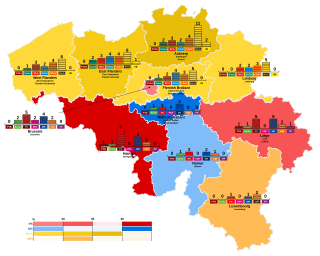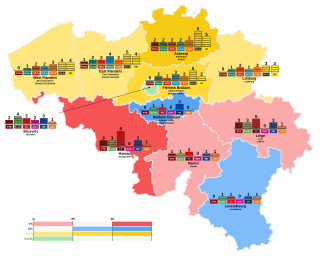
Flemish Brabant is a province of Flanders, one of the three regions of Belgium. It borders on the Belgian provinces of Antwerp, Limburg, Liège, Walloon Brabant, Hainaut and East Flanders. Flemish Brabant also surrounds the Brussels-Capital Region. Its capital is Leuven. It has an area of 2,118 km2 (818 sq mi) which is divided into two administrative districts containing 65 municipalities. As of January 2019, Flemish Brabant had a population of 1,146,175.

Belgium is a federal state comprising three communities and three regions that are based on four language areas. For each of these subdivision types, the subdivisions together make up the entire country; in other words, the types overlap.

The Kingdom of Belgium is divided into three regions. Two of these regions, Flanders and Wallonia, are each subdivided into five provinces. The third region, Brussels, does not belong to any province and nor is it subdivided into provinces. Instead, it has amalgamated both regional and provincial functions into a single "Capital Region" administration.
Ecolo, officially Écologistes Confédérés pour l'organisation de luttes originales is a French-speaking political party in Belgium based on green politics. The party is active in Wallonia, the Brussels-Capital Region, and the German-speaking Community of Belgium.

The Federal Parliament is the bicameral parliament of Belgium. It consists of the Chamber of Representatives and the Senate. It sits in the Palace of the Nation. The Chamber of Representatives is the primary legislative body; the Senate functions only as a meeting place of the federal communities and regions.

The Court of Cassation of Belgium is the supreme court of the Belgian judiciary. The court is composed of thirty judges with life tenure who are nominated by the High Council of Justice of Belgium and appointed by the Belgian federal government. The court handles cases in the two main languages of Belgium, Dutch and French, and provides certain facilities for cases in German. The court is assisted in its work by a public prosecutor's office and a bar association, which both function separately from other structures. The duty of the public prosecutor's office is to provide advisory opinions to the court on how the law ought to be interpreted and applied. The attorneys of the court's bar association assist litigants in proceedings before the court; in certain cases, their assistance is mandatory.

The Arrondissement of Tournai is a former arrondissement in the Walloon province of Hainaut, Belgium. It is both an administrative and a judicial arrondissement. However, the Judicial Arrondissement of Tournai also comprises the municipality of Lessines in the Arrondissement of Soignies and all municipalities of the Arrondissement of Ath, with the exception of the municipalities of Brugelette and Chièvres. In 2019 it was merged into the new Arrondissement of Tournai-Mouscron.

The Judicial Arrondissement of Eupen is a judicial arrondissement located in the Walloon Province of Liège, in Belgium. It comprises the 9 municipalities of the German-speaking Community. It is not an administrative arrondissement. As of 2016, there are 19,321 under its jurisdiction.

The tribunals of first instance are the main trial courts in the judicial system of Belgium. The tribunals of first instance are courts of general jurisdiction; in the sense that they have original jurisdiction over all types of cases not explicitly attributed to other courts. They handle a wide range of civil cases, criminal cases, and cases under the scope of juvenile law and family law. They also hear appeals against the judgements of the police tribunals and justices of the peace. The judgements of the tribunals of first instance can be appealed to the courts of appeal in turn. There is a tribunal of first instance for each of the twelve judicial arrondissements ("districts") of Belgium, except for the arrondissement of Brussels. The arrondissement of Brussels has two tribunals of first instance, a Dutch-speaking one and a French-speaking one, due to the sensitive linguistical situation in the area. The territories of the current judicial arrondissements largely coincide with those of the provinces of Belgium. Most of the tribunals of first instance have multiple geographical divisions, with each having their own seat. As of 2020, the 13 tribunals of first instance have 27 seats in total. Further below, an overview is provided of all seats of the tribunals of first instance per arrondissement.

The police tribunal is the traffic court and trial court which tries minor contraventions in the judicial system of Belgium. It is the lowest Belgian court with criminal jurisdiction. There is a police tribunal for each judicial arrondissement ("district"), except for Brussels-Halle-Vilvoorde, where there are multiple police tribunals due to the area's sensitive linguistic situation. Most of them hear cases in multiple seats per arrondissement. As of 2018, there are 15 police tribunals in total, who hear cases in 38 seats. Further below, an overview is provided of all seats of the police tribunal per judicial arrondissement.

The courts of appeal are the main appellate courts in the judicial system of Belgium, which hear appeals against judgements of the tribunals of first instance, the enterprise tribunals and the presidents of those tribunals in their judicial area. There are five courts of appeal for each of the five judicial areas, which are the largest geographical subdivisions of Belgium for judicial purposes. The division of the Belgian territory into the five judicial areas is laid down in article 156 of the Belgian Constitution. A judicial area covers multiple judicial arrondissements ("districts"), except for the judicial area of Mons. Each arrondissement has a tribunal of first instance. Further below, an overview is provided of the five courts of appeal and the judicial arrondissements their judicial area covers. It is important to note that the courts of appeal do not hear appeals against judgements of the labour tribunals; these are heard by the courts of labour.

The court of labour is the appellate court in the judicial system of Belgium which hears appeals against judgements of the labour tribunals and the presidents of those tribunals in their respective judicial area. There are five courts of labour for each of the five judicial areas, which are the largest geographical subdivisions of Belgium for judicial purposes. Some of the courts of labour hear cases in multiple seats. Further below, an overview is provided of the five courts of labour and their seats. Whilst their territorial organisation is the same, the courts of labour are separate from the courts of appeal, which are the main appellate courts in Belgium.

The court of assizes is the trial court which tries the most serious crimes in the judicial system of Belgium. It is the highest Belgian court with criminal jurisdiction; as such, it is the only Belgian court that can sentence someone to life imprisonment. The courts of assizes are not permanent courts; a new court of assizes is assembled for each new trial. There is a court of assizes in each of the ten provinces of Belgium, as well as one in the arrondissement of Brussels-Capital which is not part of any province. Further below, an overview is provided of the eleven courts of assizes and their seats. They are the only courts in Belgium for which the provinces are used as territorial subdivisions. They are also the only courts in Belgium that hold jury trials. The jury acts as sole trier of fact, but decides on the penalty together with the judges. The trial by jury of certain crimes is laid down in article 150 of the Belgian Constitution. The Belgian courts of assizes have the same origin as their French namesakes.

The justice of the peace is the small claims court in the judicial system of Belgium, and stands at the bottom of the Belgian judicial hierarchy. There is a justice of the peace for each judicial canton, which is the smallest geographical subdivision of Belgium for judicial purposes. Most judicial cantons cover multiple municipalities, except in the case of larger towns and cities, which are often divided into multiple judicial cantons. A judicial canton has an average population of 50,000 to 60,000 people, but some have a population as low as 30,000 people or as high as 100,000 people. The justices of the peace only have jurisdiction over their own canton. As of 2017, there are 187 cantons with as many justices of the peace in Belgium, who hear cases in 229 seats.

Federal elections were held in Belgium on 25 May 2014. All 150 members of the Chamber of Representatives were elected, whereas the Senate was no longer directly elected following the 2011–2012 state reform. These were the first elections held under King Philippe's reign.
The European Finance Association (EFA) is a professional association of more than 2,000 professionals and financial economists involved in the high-level research, study, teaching, and practice of finance. The association was founded in 1974 and hosts an annual meeting in August. The 40th annual meeting of the EFA was held in Cambridge, UK in 2013. The 48th annual meeting was chaired by EFA President Professor Elena Carletti and was organised by Bocconi University in Milan, Italy in August 2021. The 49th annual meeting was organised by IESE Business School in Barcelona, Spain, in August 2022 and chaired by EFA Vice President Professor Xavier Vives. The 50th annual meeting will be held in Amsterdam, the Netherlands, in 2023 chaired by Professor Albert J. Mankveld at Vrij Universiteit Amsterdam. EFA also organises doctoral events including an intensive and competitive tutorial designed for PhD students in Finance who are nearing the end of their doctoral thesis and will soon be on the job market.

Federal elections were held in Belgium on 26 May 2019, alongside the country's European and regional elections. All 150 members of the Chamber of Representatives were elected from eleven multi-member constituencies.
In Belgium the standard time is Central European Time (UTC+01:00). Belgium observes Summer Time from the last Sunday in March to the last Sunday in October. The transition dates are the same as for other European countries.
Constituencies are used for elections in Belgium.
Mathilde Boniface was a Belgian politician and an activist in the Walloon Movement. She was a member of the Chamber of Representatives and the Walloon Regional Council from 1981 to 1985, and a founder and member of the Walloon Rally.










